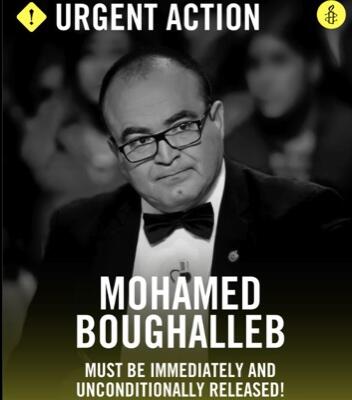- 最新情報:
- 2025年2月15日
- 国名:
- チュニジア
- 対象者:
- モハメド・ブガレブ(男性)
- 期限:
- 2025年6月24日
- 配信日:
- 2025年2月15日
- UA No:
- 008/2025
ジャーナリストのモハメド・ブガレブさんは昨年3月22日、宗教省高官による告発を受けて逮捕された。告発の背景には、ソーシャルメディアやテレビ、ラジオでの、宗教省の支出に対する批判的発言があった。逮捕後、ブガレブさんは公務員の名誉を棄損したとして有罪判決を受け、禁錮8カ月を宣告された。また、別の発言でもサイバー犯罪に関する法令違反の容疑を受けた。収監されたブガレブさんは、持病の治療を受けられず、体調の悪化が続いている。当局は、表現の自由の権利を行使しただけで拘束されているブガレブさんを即時無条件に釈放すべきだ。
 大統領や高官を汚職と失政で厳しく批判してきたブガレブさんは、8カ月間の刑期を終えていたが、別の容疑での恣意的な拘置が続いている。昨年4月、ソーシャルメディアでフェイクニュースを広めたとしてサイバー犯罪容疑に問われ、公判前勾留を命じられた。しかし、彼の弁護士によれば、ブガレブさんは指摘されている投稿の著者ではなく、そのページの所有者でもない。有罪なら、最高5年の禁錮刑と5万ディナール(約236万円)の罰金刑を科されるおそれがある。
大統領や高官を汚職と失政で厳しく批判してきたブガレブさんは、8カ月間の刑期を終えていたが、別の容疑での恣意的な拘置が続いている。昨年4月、ソーシャルメディアでフェイクニュースを広めたとしてサイバー犯罪容疑に問われ、公判前勾留を命じられた。しかし、彼の弁護士によれば、ブガレブさんは指摘されている投稿の著者ではなく、そのページの所有者でもない。有罪なら、最高5年の禁錮刑と5万ディナール(約236万円)の罰金刑を科されるおそれがある。
2024年5月以降、チュニジア当局はソーシャルメディアでの表現の自由への弾圧を強め、ジャーナリスト2人に禁錮1年を宣告してきた。その一人、ネットメディアを創設した男性は、11日間の拘束後、執行猶予付きの9カ月の判決を受けた。コメンテーターでもある弁護士は、移民に関するコメントで逮捕され、8カ月の実刑判決を受け、あらためて移民に対する差別を訴えたことで、さらに2年の刑を追加された。
2022年9月のサイバー法の施行以降、当局は言論の自由の弾圧を強めてきたが、この弾圧は、アフリカ憲章、市民的および政治的権利に関する国際規約に基づくチュニジアの義務に違反する。これらの条約が保証する表現の自由が、チュニジアでは「フェイクニュース」に関する規定で制限されてきた。
サイード大統領が、2021年7月に非常事態下での権限を行使して以来、チュニジア市民の人権は制限されてきた。2022年2月から、野党員、活動家、ジャーナリスト、反対派とみなされた人たちがいつ逮捕や起訴されてもおかしくない事態に陥っている。2022年半ば以降、70人以上が、表現、集会、結社の自由の権利を行使して拘束されてきた。こうした弾圧は、法の支配を弱体化し、基本的人権を侵害する。
アクションしてください。
当局に以下の要請を盛り込んだ英語の要請文をメールかツイッターできるだけ早くお送りください。
- 人権を平和的に行使しただけで拘束されているブガレブさんを即時、無条件で釈放することを求める。
- 釈放までの間、囚人の処遇に関する国際基準に沿った対応と適切な医療措置を保証する。
- 当局は、表現の自由の行使を理由にした、批判者やジャーナリストの拘束を停止する。
要請例文
President of the Republic Kais Saied
Route de la Goulette, Tunisie
Email: contact@carthage.tn
Twitter: @TnPresidency
Your Excellency,
I write to express my grave concern over the prolonged arbitrary detention of 60-year-old journalist Mohamed Boughalleb since March 2024 solely for peacefully exercising his human rights. Security forces arrested him on 22 March based on a complaint submitted by a senior official of the Ministry of Religious Affairs after Mohamed Boughalleb publicly questioned the ministry’s spending.
On 26 March 2024, the public prosecutor at the Tunis Court of First Instance charged Mohamed Boughalleb with “attributing illegal acts to a public official without providing evidence” and “insulting others or disturbing their comfort through public telecommunications networks” under Articles 128 of the Penal Code and 86 of the Telecommunications Code, respectively. On 17 April, Mohamed Boughalleb was convicted and sentenced to six months in prison; his sentence was increased to eight months by the Tunis Court of Appeal on 28 June 2024. On 5 April 2024, an investigative judge at the Tunis Court of First Instance charged Mohamed Boughalleb in a separate case under article 24 of Decree-Law 2022-54 on Cybercrimes for “using telecommunications networks to produce, send, or disseminate “fake news” or “rumours;” to harm, defame, or incite violence against others” following a complaint from a professor claiming that Mohamed Boughalleb “insulted” her on Facebook. Mohamed Boughalleb has maintained that the comments she claimed were “insulting” were not made from his account. The judge issued a pre-trial detention order in connection to these charges.
Mohamed Boughalleb’s health has severely deteriorated during his unjust detention. He suffers from chronic illnesses such as diabetes and high blood pressure; and developed prostate problems. His diabetes has worsened in prison, triggering repeated infections. His eyesight and hearing were severely impacted. Despite this, he has not been granted access to adequate medical care in prison, including his daily medicine and regular medical examinations. On 4 November 2024, Mohamed Boughalleb was transferred from his prison cell to another wing of El Mornaguia prison where conditions are worse due to overcrowding.
I urge you to ensure the immediate and unconditional release of Mohamed Boughalleb as he is detained solely for the peaceful exercise of his human rights. Pending his release, I call on you to ensure that he is held in conditions meeting international standards for the treatment of prisoners and granted regular access to adequate healthcare. Moreover, I call on the Tunisian authorities to cease targeted arrests of critics, journalists and political opponents for the peaceful exercise of their rights to freedom of expression.
Yours sincerely,




